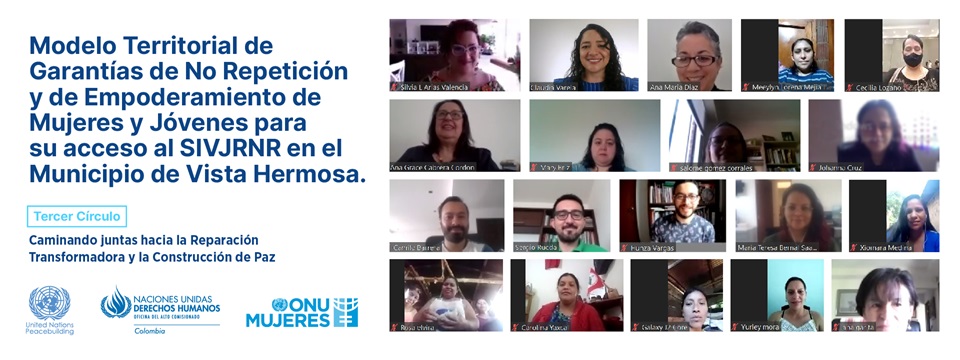Women from Colombia and Guatemala share their experiences in the search for justice and peace building
Date:

Approximately 50 Colombian and Guatemalan women met virtually to exchange their experiences on the importance of peace building from the centrality of women's human rights.
The meeting, organized by UN Women with the support of the Gender and Youth Promotion Initiative (GYPI), UN Secretary-General's Peacebuilding Fund (PBF) and the Office of the United Nations High Commissioner for Human Rights, took place within the framework of the 'Territorial model of guarantees of non-repetition and empowerment of women and youth for their access to the SIVJRNR'.
The protagonists of this meeting were women from Sepur Zarco, Guatemala, and Meta, Colombia. The dialogue revolved around their experiences in terms of justice, truth, reparation and non-repetition.
The women and grandmothers of Sepur Zarco in Guatemala are an inspiring reference for the whole world for their search for justice for the crimes committed against them during the Guatemalan civil war.
Their search for truth and non-repetition led them to develop a best practice model that allowed them to access justice and expose the gender-based violence they suffered during their country's 36-year civil war.
The criminal proceedings led to the conviction of two former military personnel for crimes against humanity (rape, murder and enslavement) and awarded the survivors 18 reparations measures for themselves and their communities.
Sepur Zarco's litigation model highlights the participation of survivors of crimes committed during the civil war in its design and implementation, peer group support, victim protection strategies and reparations measures focused on community development.
Their case is a reference for women victims of the conflict in Colombia, particularly for those of the municipality of Vista Hermosa, in Meta, as they are a reference of the path they undertook to obtain restorative justice and move towards peace building by placing women's rights at the center.
During the virtual meeting, Demesia Yat, one of the grandmothers of Sepur Zarco, commented that "we are still waiting for the reparation measures that the justice system gave us, the most important thing is to solve the legal problem of the land, if it is not solved, we will not be able to receive the other reparation measures. Our struggle now is for them to comply with us, we dream of reparations and thus be able to offer a different life to the young people of our community".
Likewise, Monica Gonzalez, who was part of the territorial model in Vista Hermosa, Meta, which has allowed them to access the Integral Justice System and expose the cases of those who were victims during the Colombian internal conflict, commented that "This space made possible this meeting with our colleagues from Guatemala, in which many women could meet, empower ourselves about our rights, and realize that we are not alone, that there are more women who have the same pain and who are also victims".
At the closure of the virtual meeting, Argentine writer and activist Rita Segato reflected on what unites the women and young people of Guatemala and Colombia: "The fact that the women of Sepur Zarco, in Guatemala, and those of Vista Hermosa, in Colombia, can speak within this space about the construction of peace and justice in each of their territories, even though they are such different and distant places, creates a sense of collectivity among women in similar situations, and that is an extraordinary achievement. The challenge for Sepur Zarco begins after the sentencing of these military men, in which the restorative aspect is fulfilled; and the challenge in the Colombian case is in what has happened after the Peace Agreements. It is a long process".